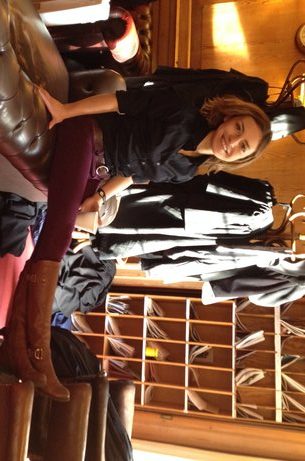
Dominique Kunciw is looking to find new ways to fight cancer through computational analysis and synthetic chemistry to discover what turns a healthy cell cancerous.
Dominique Kunciw [2013] is looking to find new ways to fight cancer through computational analysis and synthetic chemistry to discover what turns a healthy cell cancerous.
She will present her work on a gene strongly implicated in breast cancer and several other cancers, such as skin cancer, at the Royal Society of Chemistry’s 8th annual Biological and Medicinal Chemistry Postgraduate Symposium on 12 December.
Her PhD project, entitled Multi-pharmacophore Modeling and Synthesis of Macrocyclic Phosphopeptidomimetics as Polo-like Kinase 1 Inhibitors, focuses on identifying compounds which might inhibit the expression of Plk1, a gene whose overexpression is often observed in tumour cells. It is being studied as a target for cancer drugs.
Instead of just synthesising different molecules and hoping they will have an impact on cancer molecules, Dominique is doing detailed computational analysis and attaching a dipeptide tail to macrocyclic compounds so that she can tell if it has any inhibiting impact on Plk1.
She says: “I believe there is a strong chance of finding biological hits because of the computational work involved to identify the target compounds.”
Back to Cambridge
Dominique’s life has come full circle back to Cambridge. Although she is a US citizen, she also has UK citizenship since she was born at RAF Lakenheath near Cambridge. Her parents were in the US Air Force. Both are now retired at the level of lieutenant colonel and have been strong role models for her. Her mother flew C-141 Airlifters while her father was a test pilot engineer. In fact her mother was flying during the first Gulf War while pregnant with Dominique.
Dominique spent the first few years of her life in Ely and then the family moved to the US and lived in New Jersey. They are now based in Maryland.
Because of her parents’ background, Dominique and her older sister grew up with a strong sense of service and an interest in travel. At high school, she volunteered at a local hospital and during her undergraduate years, for instance, she spent a month in Ecuador and travelled round Thailand and Cambodia on her own after graduating.
Her parents also had a strong work ethic as a result of being first and second generation Eastern Europeans in the US. “I was instilled with a sense of the need to succeed and compete,” says Dominique. Her father is from Ukraine and her mother’s mother was Polish.
At school Dominique, who competed in nationally ranked tennis competitions, was high school valedictorian and senior class vice president, always had a natural affinity for maths and entered several maths competitions. Her mother has a degree and masters in maths and her father studied aerospace engineering and teaches maths at the Salisbury University so Dominique and her sister were encouraged in that direction.
From maths to chemistry
Initially, she intended to major in maths at Salisbury University, but she opted in the end for something that was more applied. “I wanted to use what I know to help people,” she says. Her decision to switch to chemistry followed an international internship in Paris in the summer of her second year. She researched peptidomimetics and presented her research to the American Chemical Society. The following summer, she also did an internship in Germany, working on an inhibitor of the chemical warfare nerve agent VX. During her research the German military came to take a look round the laboratory.
Her course lasted four years and after graduating she got a summer job in the construction industry to experience something completely different. Up until then her main paid work had been as assistant manager of a local tennis club.
She applied to several universities to pursue her studies. On travelling to Cambridge she was immediately struck by the positive atmosphere of the place and she was interested in the work being done on antibiotics, having written a paper on anti-tubercular research while at Salisbury University. When she was accepted, though, she was unable to work on that project and instead started research on a project called Diversity Oriented Synthesis of Macrocyclic Scaffolds Using Multi-dimensional Coupling which involves creating a library of diverse molecules of different shapes and structures which can be tested against cancer lines and bacteria. Her work has since developed to focus on Plk1.
It is all-encompassing and Dominique, whose family has a history of cancer, spends 10 to 12 hours in the laboratory most days, including some weekends. However, she still finds time for other commitments and is currently Welfare Officer at Gonville and Caius College which involves providing confidential support on a range of mental and emotional issues.
Dominique had not heard of the Gates Cambridge Scholarship before she applied to Cambridge and is the first Gates Cambridge Scholar from Salisbury University. Since her success, though, several others have applied, she has done a video clip about her experience and her university has started a scholarship office. The programme embraces both her academic interests and her broader interests in serving others. She hopes to do a medical degree once her PhD is completed and eventually work with an international organisation such as the World Health Organisation.












